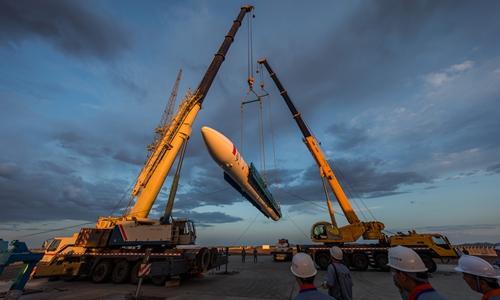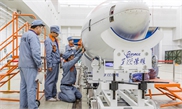
A general view of SQX-1 Y-1, the iSpace's rocket. Photo: Courtesy of iSpace
Beijing-based private rocket launch company i-Space announced a key breakthrough in its reusable launch system ahead of a planned IPO, a boost for the nation's commercial space sector, experts said.
I-Space successfully completed a landing buffer test of its reusable rocket Hyperbola-2, marking an important breakthrough in reusable launch technology, the company said on its official WeChat account on Friday.
I-Space has a plan to issue shares on the Science and Technology Innovation Board, which would make it China's first listed commercial space firm, media reported.
The listing is an import step for China's private rocket companies to raise funds, obtain better technology, and attract talent and research and development resources, Wang Ya'nan, chief editor of Aerospace Knowledge magazine, told the Global Times on Sunday.
"The IPO is expected to win market favor as a promising investment target," Wang said.
He said that reusable rockets can make launches more cost-effective, and they will be the key to competition in the commercial space field.
The rocket developed by i-Space is expected to be launched for the first time in 2021, making up for China's lack of reusable liquid-propellant rockets. The company said that it has made significant technical progress in the aerodynamic, structural, control and power subsystems of reusable launch technology.
After the IPO, the key to the sustainable development of i-Space will be constant innovation, like its US counterpart SpaceX, so as to attract continued investment, Wang said.
At present, China's private commercial aerospace enterprises can only launch small satellites. But companies like i-Space have broad development prospects, experts said.
"Companies like i-Space should seek to participate in more projects, such as the construction of space stations, and Moon and Mars exploration, to have sustained development. The participation of China's commercial aerospace enterprises will help the sector make advances in cost control, decision-making efficiency, and adapting to the new situation and new technological changes," Wang said.

